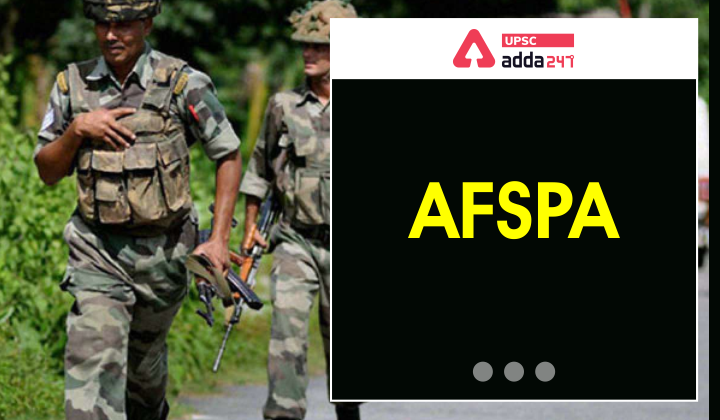Table of Contents
AFSPA: Relevance
- GS 3: Role of external state and non-state actors in creating challenges to internal security.
AFSPA: Context
- Recently, 14 civilians were killed in a case of alleged mistaken identity by the security forces in Nagaland.
- The incident triggered violence in the area and has rekindled the debate over the Armed Forces Special Powers Act (AFSPA).
AFSPA: Key points
- Six civilians who worked in a coal mine, were killed in an ambush by security forces in Nagaland’s Mon district.
- The incident triggered violence in the area, in which eight more civilians were killed after security forces allegedly opened fire. A soldier too succumbed to injuries while several others were severely injured.
- The incident has made the relatively calm state, a volatile region where people, including the Nagaland government is demanding repeal of Armed Forces Special Powers Act (AFSPA).
What is AFSPA?
- The AFSPA Act was first promulgated by the British in response to the Quit India movement in 1942.
- After Independence, Indian government decided to retain the Act in 1958.
- AFSPA law provides for special powers to the armed forces that can be imposed by the Centre or the Governor of a state, after it is declared “disturbed’’ under Section 3 of AFSPA.
- The Act defines these as areas that are “disturbed or dangerous condition that the use of armed forces in aid of the civil power is necessary’’.
AFSPA states
- AFSPA 1958 has been used in areas where militancy has been prevalent. Specifically, it has been imposed on the Northeast states, Jammu & Kashmir, and Punjab during the militancy years.
- It remains in force in Mizoram, Nagaland, Manipur, Assam, J&K, and parts of Arunachal Pradesh.
AFSPA removed from which state?
- Punjab was the first state from where it was repealed, followed by Tripura and Meghalaya.
Why was AFSPA necessary?
- AFSPA came into force mainly to curb violence in the North-eastern states
- The region was too much volatile at the time of independence and the demand of secession from the Indian state was common. E.g., the demand for the creation of Greater Nagalim.
- Insurgency: The military insurgency made the Act even more imperative. The state machinery has not been considered equipped enough to deal with these trans-national security issues.
AFSPA safety provisions
- Though AFSPA gives powers to security forces to open fire, this cannot be done without prior warning given to the suspect.
- In the recent Mon firing, it has been an issue of discussion whether the security forces gave prior warning before opening fire at the vehicle carrying coal miners.
- The Act further states that suspects apprehended by security forces should be handed over to the local police station within 24 hours.
- AFSPA states that armed forces must act in cooperation with the district administration and not as an independent body.
- In the Mon operation, local law-enforcement agencies have said they were unaware of the operation and this has made the Act more debatable.
Attempts to repeal AFSPA in the past
- In 2000, Manipur activist Irom Sharmila began a hunger-strike, which continued for 16 years, against AFSPA.
- In 2004, the Union Government set up a five-member committee, Justice Jeevan Reddy Commission, which submitted its report in 2005.
- The committee stated that AFSPA had become a symbol of oppression and recommended its repeal.
- The Second Administrative Reforms Commission has also endorsed the above recommendations.
AFSPA criticisms
- Nagaland and Mizoram faced the brunt of AFSPA in the 1950s, including air raids and bombings by the Indian military.
- The Malom massacre in 2000 in Manipur, and the killing and alleged rape of Thangjam Manorama led to the subsequent repeal of AFSPA from the Imphal municipal area.
- Fake encounters: EEVFAM (Extra Judicial Execution Victims Families Association) has alleged that since the 1970s, there have been 1,528 fake encounters in Manipur alone.
- Human rights activists have said the Act has often been used as a quid pro quo where forces and some people with vested interest settle private scores, such as property disputes, with false tip-offs provided by local informants to security forces.
- Allegations have been made against security forces of mass killings and rape.
- Probing issue: Barring one Army major, who was accused of fake encounter of 12-years old Azad Khan’s death in 2009, no prosecution has been made against security forces in other cases. The Army major himself was persecuted after 9 years in 2018.
- Activists also note that AFSPA creates an atmosphere of impunity among even state agencies.
Supreme Court on AFSPA
- In 2016, the Supreme Court rebuked the government over the continuation of AFSPA.
- The SC judgment clarified that the notion that the Act provides a free hand to security forces is flawed.
- The Court has held that due process needs to be followed in civilian complaints reported from areas under the AFSPA and that the Act doesn’t provide blanket immunity to army personnel in anti-insurgency operations.
- The apex court has even said that the continuance of the Act in any region for extended periods symbolises “failure of the civil administration and the armed forces”.



 TSPSC Group 1 Question Paper 2024, Downl...
TSPSC Group 1 Question Paper 2024, Downl...
 TSPSC Group 1 Answer key 2024 Out, Downl...
TSPSC Group 1 Answer key 2024 Out, Downl...
 UPSC Prelims 2024 Question Paper, Downlo...
UPSC Prelims 2024 Question Paper, Downlo...





